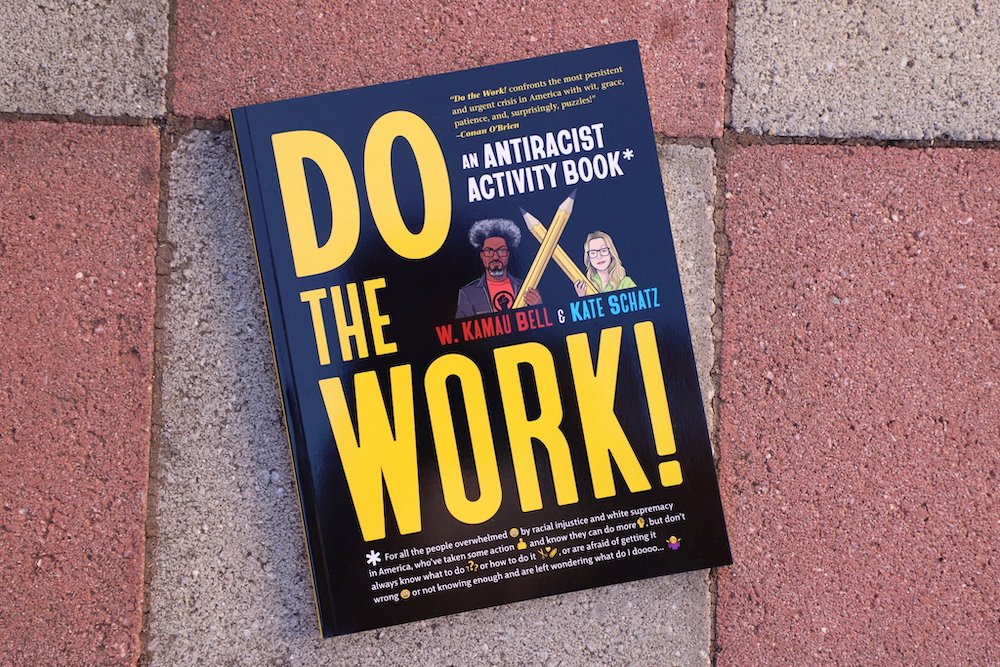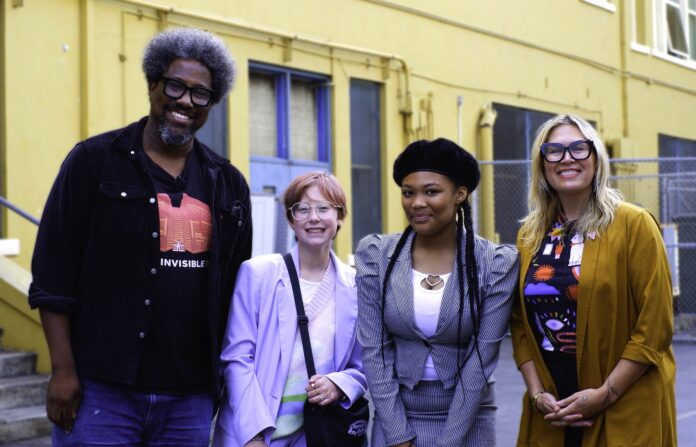On a windy day on Gateway High School’s quad in the Western Addition neighborhood a couple weeks ago, a group of donors, former students, parents, and community members gathered for “Matters of the Mind,” an annual event hosted by the public San Francisco charter to raise awareness around the school’s diverse needs—and future goals.
Awards were given, students spoke about their experiences, teachers and principals shared their thoughts, and the event closed with an honorary guest. Or, to be specific, it ended with an honorary comedian (W. Kamau Bell) and bestselling author (Kate Schatz) discussing their collaborative project, Do the Work: An Antiracist Activity Book (Workman Press).
“It’s like the idea of working out,” Bell said with a joking irony, since he admitted he rarely works out. “It’s the same with anti-racism. If you think turning your profile picture to a black square on social media is enough, you might be surprised to notice racism hasn’t ended after that. You should ask, what more can you do?”
The 160-page literary tool kit resembles a coloring book that incorporates funky elements of journaling and textbook-like knowledge that is designed to push readers into reflecting on their role in changing institutional norms. The balance of humor, information and engaging activities (including stickers, to-do lists, reflective writing prompts and more) ultimately work towards helping the reader interrogate their place within society’s hierarchy of privileges.
There are even partner activities that involve directions and scripts on how to have difficult conversations regarding race and racism. How would you approach an uncle who tells racist jokes at family gatherings? How do you interact with a neighbor whose political views oppose your own? How might you talk to a colleague with sexist outlooks? These are the questions that the book posits and then puts into activities like skits for readers of different ages and backgrounds to explore—individually and collaboratively.
“We need to keep giving a shit,” Schatz, who also authored Rad American Women A–Z, encouraged the audience. “It’s about caring and being willing. In times when the world seems so horrific, keep it small. Being good is done on a regular basis with small acts.”
The positive emphasis of the event was underscored by the recognition of the presence of community leaders and their families, such as Burls Toler, who was the first Black principal in San Francisco and the NFL’s first Black referee. Though Mr. Toler passed away in 2009, his impact at Gateway High School is still honored as a posthumous recipient of the Community Impact Award, which was given to his son and daughter who were in attendance.
There is also a Burls Toler Scholars program for young Black men at the high school, who receive additional tutoring, mentoring, and support to reach their potential and give back to their community. Graduates of the program spoke on behalf of their experiences, highlighting their appreciation for the Toler family.
It was one of the shining moments of the event—a tangible representation of what Bell and Schatz were discussing: doing the work to uplift yourself in order to uplift others.

“It’s not just about what you’re against. It’s about what you’re for,” said Bell. “The ‘for’ is where the hope is, where we can get to the other side of all this.”
In seeing different generations of students and graduates share their experiences, it was a clear reminder of why this work matters. The crossword puzzles included in the book are simply a fun, joyful, and diversified way of accessing clarity, but ultimately, the work in communities needs to be done, and conversations around anti-racism and deconstructing institutional barriers must be put into practice in the real world—something that Schatz says is not something we should shame others if they have not yet begun to do.
“This is about putting your energy into reframing, into learning how to grow from mistakes, to see it as an opportunity to learn more,” Schatz said.
It takes a lifetime to reach a place of understanding—and even then, it won’t be enough. The purpose of the workbook—at least from my perspective—is to simply invite more Americans into the process of beginning (or deepening) that journey. I’m glad I have a copy and that I could take a moment out of my busy Bay Area lifestyle to remind myself about the community I serve, and why that matters. I personally am excited to dive into the activities with my spouse to see what we discover together.
As Do the Work asks on the back cover: “Ready to get started?”





